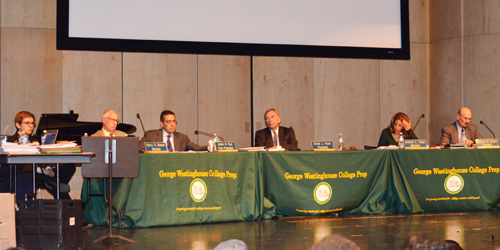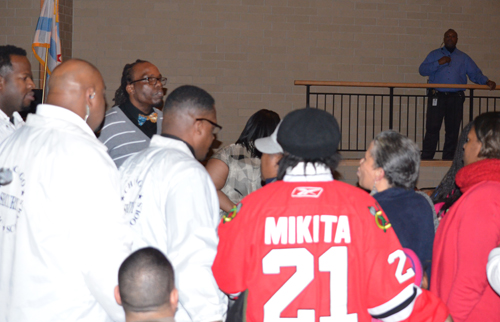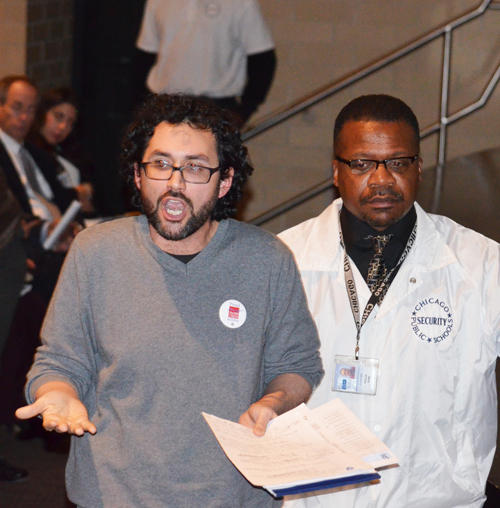MEDIA WATCH: No Tears for loss of the 'Tiers' -- but the rating policy is still nonsense... How much does the Sun-Times cover from each Board of Education meeting... and major financial challenges are ignored...
Back in the boring days before social media became the rage, the meetings of major public bodies were a regular feature in the newspapers. In Chicago, the City Council and the Board of Education were the major beats, especially when loud protests echoed throughout the Board meeting. The reason was simple: the Chicago City Council and the Chicago Board of Education make decisions that affect the largest number of people in Chicago.
 Only five of the seven members of the Chicago Board of Education bothered to show up at the November 19, 2014 Board meeting. The student Board member (far left above) has been active in his duties. The Board members present were (left to right from the second from the left) Henry Bienen, Jesse Ruiz, David Vitale, Andrea Zopp, and Carlos Azcoitia. Substance photo by George N. Schmidt.On November 19, 2014, the school Board was holding a meeting during "peoples' hours" and in the community, for the first time in more than a decade. For almost all of the 21st Century, the Chicago Board of Education has held its meetings (narrowed down to once a month) at its downtown headquarters and during what were once called "banker's hours" (the meetings usually began at 10:30 in the morning and took place while all teachers and most parents were at work.
Only five of the seven members of the Chicago Board of Education bothered to show up at the November 19, 2014 Board meeting. The student Board member (far left above) has been active in his duties. The Board members present were (left to right from the second from the left) Henry Bienen, Jesse Ruiz, David Vitale, Andrea Zopp, and Carlos Azcoitia. Substance photo by George N. Schmidt.On November 19, 2014, the school Board was holding a meeting during "peoples' hours" and in the community, for the first time in more than a decade. For almost all of the 21st Century, the Chicago Board of Education has held its meetings (narrowed down to once a month) at its downtown headquarters and during what were once called "banker's hours" (the meetings usually began at 10:30 in the morning and took place while all teachers and most parents were at work.
The November 19, 2014 drew the largest crowd in recent history, and possibly for all time. An early count by Substance counted more than 500 people in the Westinghouse High School auditorium. Although the meeting began at 4:30, people kept arriving inside until nearly six o'clock. This was in part because the parking was difficult. The Board restricted parking on the west side of the building to Board members and officials, barring most of the public. On the east side of the building, the parking lot filled up quickly. The massive turnout itself should have been a news story, but as of early on November 20, it wasn't even noted in corporate media reports.
The intense issues raised during the meeting caused emotions to run high, and eventually several people became enraged when every speaker was cut off after two minutes, and the Board President and members were lectured on showing good manners to the people whose policies were depriving their children of the education they deserved. Protests began, and eventually the protests echoed through the meeting during the four hours the Board met before going into executive session.
 Confrontations during the November 19, 2014 meeting of the Chicago Board of Education interrupted the meeting for more than ten minutes. Above, parents and students from Mollison Elementary School demanded to know why the administration had taken away teachers in the middle of the semester and were shut down by CPS security on orders of Board President David Vitale. Security also tried to prevent press photogaphers from getting photographs during the meeting. Substance photo by Nate Goldbaum. While it's difficult to adequately cover a meeting that will vote on an agenda of more than 150 pages with 60 people signing up to speak and more than 50 actually speaking, the public deserves more than a selection of what happened and a feature based on what the Board members decide to highlight.
Confrontations during the November 19, 2014 meeting of the Chicago Board of Education interrupted the meeting for more than ten minutes. Above, parents and students from Mollison Elementary School demanded to know why the administration had taken away teachers in the middle of the semester and were shut down by CPS security on orders of Board President David Vitale. Security also tried to prevent press photogaphers from getting photographs during the meeting. Substance photo by Nate Goldbaum. While it's difficult to adequately cover a meeting that will vote on an agenda of more than 150 pages with 60 people signing up to speak and more than 50 actually speaking, the public deserves more than a selection of what happened and a feature based on what the Board members decide to highlight.
The difference between the coverage in the Chicago Sun-Times and Chicago Tribune offers a telling example. The Sun-Times has been ignoring the problems raised by the "toxic swaps" -- variable interest rate borrowings by CPS between 2003 and 2007. The investigation by the Tribune has apparently resulted in the Sun-Times finding other things to cover at a Board of Education meeting than the dozen or more speakers who demanded that the Board go to arbitration on the deals. The fact that the man who engineered the deals, David Vitale, was still sitting in the President's seat at the November 19 Board meeting said a lot. Obviously the mayor and the Board are doubling down and do not intend to request any investigation of their own corruption. Meanwhile, their own Inspector General will no doubt continue his career investigating students and teachers who violate the ever changing "residency" rules and other minor problems, while the loss of $100 million to the banks gets ignored.
How much of that became "news" on November 20? Hardly any. Consider the coverage in the Chicago Sun-Times:
Chicago Board of Ed votes to change the way it rates schools. WED, 11/19/2014 - 11:19PM LAUREN FITZPATRICK
With little public notice or community involvement, Chicago Public Schools again changed the way it rates its schools Wednesday night, ratings that determine how much support or punishment a school receives.
The actual ratings, normally released in plenty of time for fall report card pickups, still won�t be made public for weeks, CPS accountability czar John Barker said at a particularly raucous meeting Wednesday night at George Westinghouse High school, 3223 W. Franklin Blvd., instead of downtown and during the day at CPS headquarters.
When Board President David Vitale welcomed West Side Ald. Jason Ervin (28th) to the microphone, Ervin replied, �Actually, welcome to you all,� asking the board to make board meetings at community sites a regular occurrence.
The change of venue manifested itself in the meeting�s tone � and volume. Rather than the usual controlled atmosphere CPS maintains in its own board room and overflow observation room, the large auditorium filled with more than the usual number of members of the public, who brought signs, filled aisles, and talked back.
Several times, the audience shouted back at the five board members on stage, after David Vitale accused speakers, including the Chicago Teachers Union�s recording secretary Michael Brunson, of not having the facts straight. Voices elevated from different parts of the dimly lit auditorium.
�This is not productive,� Vitale said finally, asking security to silence the shouters.
CPS had sold the school ratings plan, approved in August 2013, as a more nuanced way to evaluate what schools need and to hold all schools, including contract and charter schools, to the same standards. The well-known current ratings � Levels 1, 2 and 3 � were to be replaced by Tiers 1 through 5. The changes were developed with input, including from the Chicago Teachers Union and the Illinois Network of Charter Schools.
CPS recently decided instead to keep the Levels names and add in two �-plus� Levels, keeping the names that were familiar to parents.
So going forward, Level 1+ will be the top rating for schools whose best practices will be shared, Barker said. Level 1 earns principal autonomy and support from the network. Level 2+ is average performance that garners network oversight.
Levels 2 and 3 are below average and lowest performance and will receive more intense oversight and support. Level 3 district schools could see their principals removed, new Local School Council elections ordered or turnarounds recommended.
Charter and contract schools at Levels 2 and 3 risk non-renewal, Barker said.
The other recommended change was to afford CEO Barbara Byrd-Bennett discretion to maintain the top ratings of top-rated schools for a year following a dramatic change, such as a new principal, staff turnover or large influx of students.
�It is not a guarantee nor a promise that any of the schools that fall into this category would have an additional year of Level 1 status,� Barker said. �It simply gives the CEO an opportunity to provide an appropriate rating for schools based on facts.�
Jodie Cantrell, spokeswoman for the Illinois Network of Charter schools, said her member schools were surprised by �late-stage decision-making right before the rollouts,� saying the changes �weren't things that were talked about or agreed upon.�
The CEO discretion also concerned her.
�We�re just interested to see how this plays out and are concerned that the common accountability isn't so common anymore,� she said.
The parent coalition Raise Your Hand also was listed as a stakeholder in redeveloping the ratings system, but director Wendy Katten said the group�s numerous concerns about it were never addressed.
�We would never condone a policy that uses one single test score as 60 percent of a score,� she said, a test never meant to be used for ratings, according to its own website.
�The way it was delayed, renamed, tweaked during an election cycle while being used to closed schools in other years,� she was saying about the policy as security took the microphone away.
PHOTO CAPTION: Zerina Smith, 38, whose son attends Maria Saucedo Scholastic Academy, criticizes overtesting in CPS during the Chicago Board of Education's monthly meeting, held Wednesday night at George Westinghouse College Preparatory High School on the West Side. | Ashlee Rezin/For Sun-Times Media
TRIBUNE STORY COVERS FIERCE DISCUSSIONS ON 'TOXIC SWAPS'
The Chicago City Council�s Education and Child Development Committee will hold a hearing to examine Chicago Public Schools� borrowing practices, committee chair Ald. Latasha Thomas said Wednesday.
Eight aldermen signed a resolution calling for the hearing in the wake of a Chicago Tribune analysis of the school district�s foray into auction-rate debt. Leading the effort is 2nd Ward Ald. Bob Fioretti, who plans to run against Mayor Rahm Emanuel in the Feb. 24 mayoral election.
 Early in the meeting, CPS officials began turning off the microphone when speakers had reached the two minutes -- all the time allowed for members of the so-called "public" to bring their concerns to the school board. The result, though, was that people who had more to say, or were enraged by the time limits imposted on Board critics but not on those praising the Board, began to raise their voices rather than be shut up. More than a dozen people were pushed away from the microphones on orders from Board President David Vitale. Above, parent and union organizer Matt Luskin is pushed away from the microphone while the CPS "Chief Administrative Officer" Tim Cawley looks on. Substance photo by Nate Goldbaum.The issue also surfaced at a Chicago Board of Education meeting Wednesday evening where Fioretti and other speakers called on city and school officials to bring action against banks or renegotiate borrowing deals.
Early in the meeting, CPS officials began turning off the microphone when speakers had reached the two minutes -- all the time allowed for members of the so-called "public" to bring their concerns to the school board. The result, though, was that people who had more to say, or were enraged by the time limits imposted on Board critics but not on those praising the Board, began to raise their voices rather than be shut up. More than a dozen people were pushed away from the microphones on orders from Board President David Vitale. Above, parent and union organizer Matt Luskin is pushed away from the microphone while the CPS "Chief Administrative Officer" Tim Cawley looks on. Substance photo by Nate Goldbaum.The issue also surfaced at a Chicago Board of Education meeting Wednesday evening where Fioretti and other speakers called on city and school officials to bring action against banks or renegotiate borrowing deals.
The Tribune found that CPS' 2003-07 issuance of $1 billion in auction-rate bonds, paired with interest-rate swaps, could cost the district $100 million more than traditional fixed-rate bonds would have.
"They were gambling with our children�s future," Fioretti said Wednesday in a Tribune interview.
lRelated How the Tribune analyzed CPS' bond deals
WATCHDOG: BORROWING TROUBLE
How the Tribune analyzed CPS' bond deals
SEE ALL RELATED 8
The Nov. 12 resolution cites �the disturbing allegations raised in the Chicago Tribune series� and asks Thomas, 17th, �to hold hearings and take testimony from expert witnesses concerning the current borrowing practices of Chicago Public Schools.�
Thomas said she had yet to see the resolution but was willing to explore the issue at committee level. Thomas, unlike Fioretti, typically sides with the mayor on major issues.
No hearing date has been set.
Borrowing Trouble: The complete Tribune series
Borrowing Trouble: The complete Tribune series
OPEN LINK
Fioretti also spoke at a Chicago Board of Education meeting Wednesday evening, calling on the mayor and school board to bring either a lawsuit or an arbitration claim against banks that are party to CPS deals.
Attempts to reach the mayor�s office and CPS officials for comment were unsuccessful Wednesday.
CPS has not entered into any auction-rate bonds or interest-rate swaps since 2007, records show.
cComments
@dd9255 I wonder who put the audience up to that? The average and majority of CPS parents couldn't come up with a correct definition of what a bond as a financial instrument is. However, I am sure they know what a bond posted to get released from the cook County jail is...
J. PAUL GETTY'S EAR
AT 6:37 AM NOVEMBER 20, 2014
ADD A COMMENTSEE ALL COMMENTS 13
The resolution details school board President David Vitale�s corporate banking background, which includes serving as vice chairman and director of Bank One Corp. and as president and CEO of the Chicago Board of Trade, and declares that �responsibility for pursuing such a risky financial course rests squarely on David Vitale.�
During the public comment period at the school board meeting Wednesday night, Fioretti cited the Tribune�s findings and called on the mayor and school board to bring either a lawsuit or an arbitration claim against banks that are party to CPS deals.
Francine Greenberg-Reizen, who identified herself as a Spanish teacher at Marshall High School, told the board it had the "obligation and the opportunity" to try to renegotiate or seek monetary damages for the deals.
"As a teacher I help my students see that some of the richest opportunities for learning come from our past mistakes," she said.
The Chicago Teachers Union has repeatedly criticized the district's use of swaps, which are one component of the deals the Tribune analyzed.
At one point during the public comment period, Vitale began to speak about the district�s borrowing deals, telling one speaker �your facts are not correct.� But after several audience members interrupted with shouts blaming Vitale for the lost funds, he stopped and signaled for public comments to continue.
Vitale, appointed as school board president by Emanuel in 2011, was a main architect of CPS� risky borrowing strategy, the Tribune series found. Vitale served in key administrative roles at CPS from 2003-08 and encouraged the district to move away from traditional fixed-rate debt.
�In the municipal market, there were more creative things being done,� he told the Tribune. �More floating-rate options at cheaper rates that you could fix with swaps. So, yes, we were going to take advantage of all those new instrument opportunities to finance the debt.�

